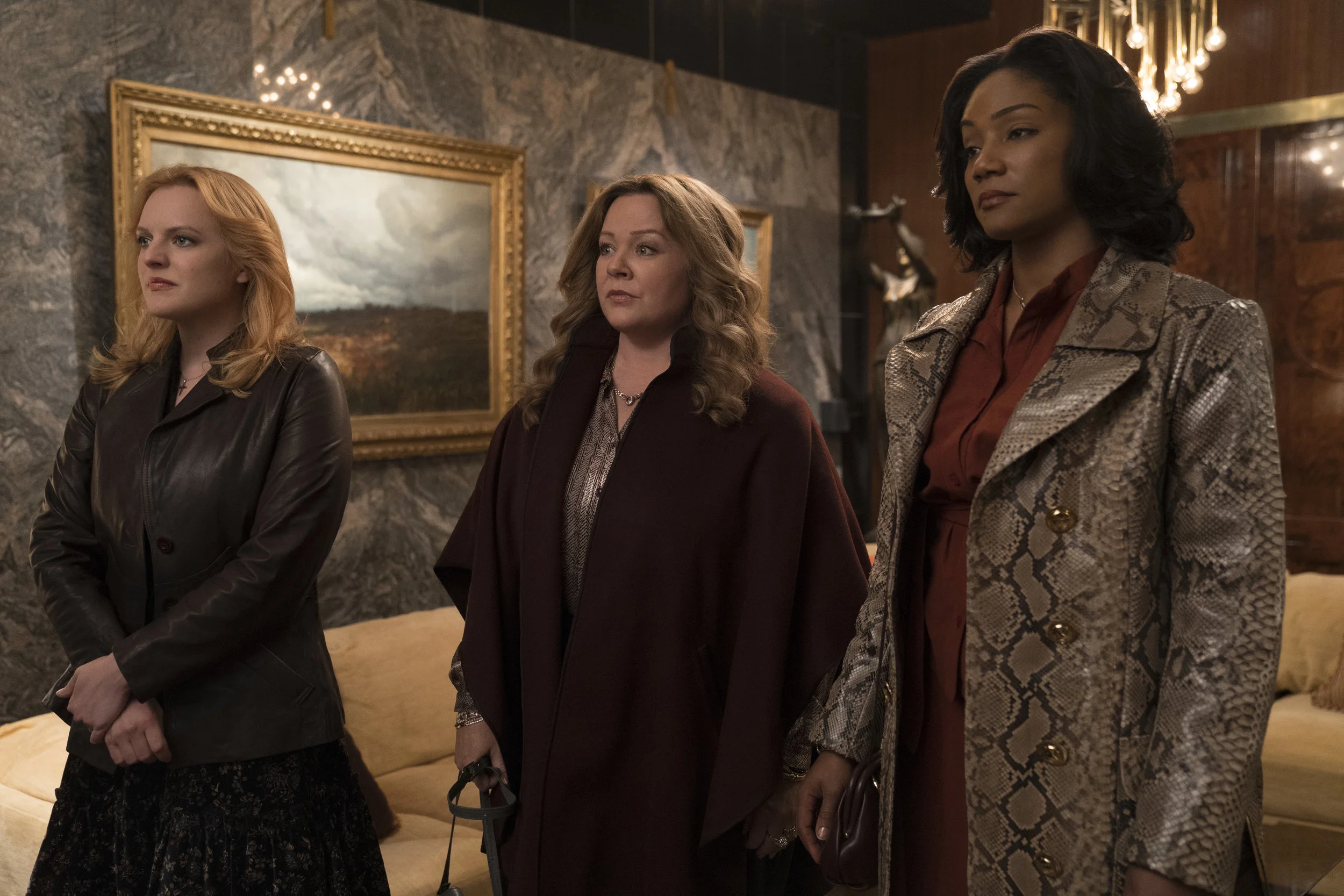The Kitchen: A plethora of underserved characters and an uneven tone makes for one undercooked fem-mob movie
By Karen Gordon
Rating: C
There’s star power in front of and behind the camera in the new mob action-drama The Kitchen. But all that talent, unfortunately, doesn’t add up to a satisfying movie.
The Kitchen is a mob story where the women take the lead both in front of and behind the camera. The screenplay is adapted from a comic book series, part of the DC Vertigo imprint, written by Ollie Masters and illustrated by Ming Doyle. More significantly, it's the directorial debut of Andrea Berloff, who was nominated for a screenwriting Oscar as the co-writer of Straight Outta Compton
Elizabeth Moss, Melissa McCarthy and Tiffany Haddish learn to play the mob protection game
There’s power on screen too. Melissa McCarthy, Elisabeth Moss and Tiffany Haddish play Kathy, Claire and Ruby, respectively. It’s 1978, and the three are wives of members of an Irish mob that controls the Hell’s Kitchen area of Manhattan.
When the husbands are caught during a robbery, they’re sent up for three years.
Their boss, Little Jackie (Myk Watford) is supposed to take care of the wives, but he doesn’t give them enough money to live on. And when Kathy and Ruby go to plead their case, he treats them with contempt. He dismissively tells them he’s short of cash because some of the businesses that pay protection money are defaulting.
Kathy and Ruby go to meet with one of the business owners who complain that Little Jackie is slacking. So, they promise better service, and soon the three women are taking over the territory, using a couple of Little Jackie’s enforcers.
This doesn’t go over well with the old guard, but the women prevail and soon are running it all. They’re making money, for once in their lives they have real power and that breeds a new confidence for them.
Claire’s world is changing the most. She’d been badly abused by her now jailed husband, and seems to attract abusers. Then, Gabriel (Domhnall Gleeson), a former flame and Vietnam vet who may or may not be a sociopath. He schools them in the art of assassination and body disposal, as he romances Claire with sweetness, rather than violence, and brings out her inner assassin.
But success means enemies too. The women have a steep learning curve as they deal with reluctant “clients” and more experienced and established neighbouring mafiosi who want a piece of the action.
And then their own alliance starts to fracture.
This is not an unfamiliar trajectory for a mob story. A group of criminals succeeds by making its own rules that work until their loose agreement starts to show strain. Flipping the script to put women in the main roles in this context instead of men, does mean there are some differences, which is a good thing, but not as much as you’d imagine.
Berloff, who also wrote the screen adaptation, nods at the issue of where women sit in this (and the greater world), but seems more interested in making a solid mob movie.
She gets about half way there.
Despite a terrific cast all doing their jobs well, The Kitchen suffers from two major problems:
The first is tone. Berloff mixes the reality of living in the violent criminal world with a dark humour. Of course the master of this is Martin Scorsese, who set gold standards for modern mob movies with, for instance, Goodfellas. But achieving that balance isn’t easy.
In The Kitchen, Berloff fails to attain that balance, which makes for an uneven tone.
But the bigger problem is the script itself. Berloff writes great dialogue, but the plot brings in a series of secondary characters, allies or antagonists, and the script doesn’t really lay that out properly. It’s like reading a book and skipping a few pages in every chapter. Sure, we’ll get some of it, but as the movie goes on not enough has been set up to properly lose yourself in the story.
As well, Berloff has ponied up what must have been big bucks for some era specific songs. The movie boasts a terrific soundtrack. But it’s not always used well. And after a while, the songs are a distraction, not an enhancement.
For a first feature, Berloff set herself a major challenge, but the story structure fails her. But the cast is strong and she conjures a mood, a sense of the gritty streets of New York, which speaks to her talent as a director.
While The Kitchen is frustrating, it will be interesting to see what she does next with her obvious skills.
The Kitchen. Directed by Andrea Berloff. Starring Melissa McCarthy, Elizabeth Moss and Tiffany Haddish. Screening in theatres nationwide now.

